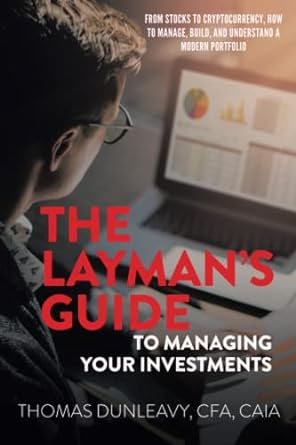Question
QUESTION 19 Question 19: The following are all technical indicators except a. contrary opinion b. support and resistance levels c. calculations of a company's free
QUESTION 19
-
Question 19: The following are all technical indicators except
a. contrary opinion
b. support and resistance levels
c. calculations of a company's free cash flow
d. moving averages
e. analyzing price channels stocks were placed in
4 points
QUESTION 20
-
Question 20: A company has a market capitalization of $30 billion, total assets on the books of $15 billion, net income of $5 billion and cash flow of $3 billion. Its P/E ratio is
a. 5
b. 6
c. 10
d. 3
e. 2
4 points
QUESTION 21
-
Question 21: The risk premium
a. is the total return you receive on an investment.
b. is the expected rate of return on an investment.
c. is the required rate of return on an investment.
d. is the cost of capital.
e. is the expected return on an investment minus the risk free rate of return.
4 points
QUESTION 22
-
Question 22: Using the valuation method discussed in class for Coca Cola, the following statistics were given:
Price at time zero $24.00
Previous dividend per share paid $1.00
Earnings per share $2.00
Projected growth rate in dividends 8%
Market P/E multiple at time zero and at end of period 18
Projected growth rate of earnings 10%
Ending relative P/E for company 1.3
What is the ending price 3 years later?
a. $30.51
b. $58.21
c. $69.00
d. $75.35
e. $75.42
4 points
QUESTION 23
-
Question 23: Using the statistics in the example above, the IRR is
a. 50.2
b. 29.9
c. 58.1
d. 24.3
e. 48.2
4 points
QUESTION 24
-
Question 24: The following are all examples of ethical conflicts not handled correctly EXCEPT
a. creating a portfolio that is too aggressive for a client hoping that it will grow more rapidly and provide a higher investment management fee (the fee is based on % of assets under management) for the advisor.
b. buying a product from an investment firm who secretly "kicks back" money to the advisor.
c. Purchasing a product with the highest commission when there are better products at lower commission.
d. Accepting an engagement appraising another advisor's work when you would like to be the client's advisor but disclosing that to the client.
e. Recommending that a client purchase shares in a company that you secretly own that is having cash flow difficulties.
4 points
QUESTION 25
-
Question 25: Why do some security analysts prefer cash flow per share figures in appraising a company's value?
a. They don't reflect depreciation.
b. They have smaller statistics than earnings per shares.
c. It is more difficult to manipulate accounting wise than earnings per share.
d. Dividends paid per share has no effect on sales per share.
e. Dividends paid per share has too much effect on EPS.
Step by Step Solution
There are 3 Steps involved in it
Step: 1

Get Instant Access to Expert-Tailored Solutions
See step-by-step solutions with expert insights and AI powered tools for academic success
Step: 2

Step: 3

Ace Your Homework with AI
Get the answers you need in no time with our AI-driven, step-by-step assistance
Get Started


